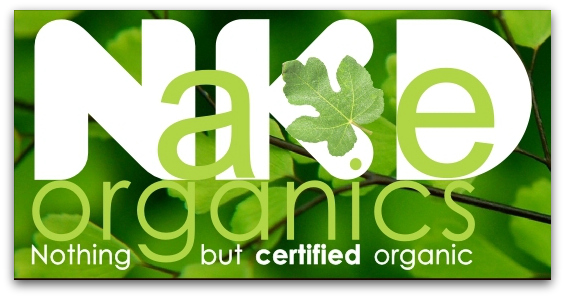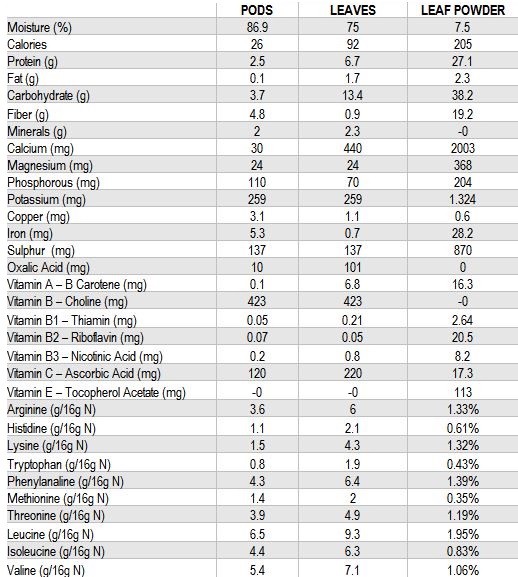|
|
www.moyoway.com |
Buy your Certified Organic |
|
|
CLICK FOR NAKED www.moyoway.com |
Moyo is an African origin word which implies that the
"heart and mind act as one to cultivate the spirit”
Moringa Nutrition Breakdown
>Home Page >>Au Natural >>>Natural Resources >>>>Moringa Oleifera >>>>>Moringa Nutrition
Moringa nutrition is a powerhouse of a plant that contains over 92 nutritional values. It is in fact, scientifically the most nutrient dense plant ever discovered.

Image Credit : Forest Starr & Kim Starr
Moringa nutrition - All vitamins A-K
Vitamin A (alpha-and beta carotene), Vitamin B1 (Thiamine), Vitamin B2 (Riboflavin), Vitamin B3 (Niacin), Vitamin B6 (Pyridoxine), Vitamin B7 (Biotin), Vitamin B12 (Cyanocobalamin), Vitamin C (Ascorbic Acid), Vitamin D (Cholecalciferol), Vitamin E (Tocopherol), Vitamin K, Folate (Folic Acid) and Biotin.
Moringa contains all vitamins A-K, with many more times the vitamin content you will find in other fruits and vegetables.
Moringa nutrition benefits
Vitamin A (beta carotene) is needed by the retina of the eye in the form of a specific metabolite, the light-absorbing molecule retinal. This molecule is absolutely necessary for both scotopic vision and colour vision. Vitamin A also functions in a very different role – as an irreversibly oxidized form retinoic acid, which is an important hormone-like growth factor for epithelial and other cells.
Vitamin B1 (thiamine) helps fuel the body by converting blood sugar into energy. It keeps the mucous membranes healthy and is essential for the nervous system and cardiovascular and muscular functions.
Vitamin B2 (riboflavin) is required for a wide variety of cellular processes. Like the other B vitamins, it plays a key role in energy metabolism, and for the metabolism of fats, ketone bodies, carbohydrates, and proteins. It is the central component of the cofactors FAD and FMN, and is therefore required by all “Flavoproteins”.
Vitamin B3 (niacin), like all B complex vitamins, is necessary for healthy skin, hair, eyes, and liver. It also helps the nervous system function properly. Niacin helps the body produce sex and stress-related hormones in the adrenal glands and other parts of the body. It is effective in improving circulation and reducing cholesterol levels in the blood.
Vitamin B6 (pyridoxine) is required for the synthesis of the neurotransmitters serotonin and norepinephrine and for myelin formation. Pyridoxine deficiency in adults principally affects the peripheral nerves, skin, mucous membranes, and the blood cell system. In children, the central nervous system (CNS) is also affected. Deficiency can occur in people with uremia, alcoholism, cirrhosis, hyperthyroidism, malabsorption syndromes, congestive heart failure (CHF), and in those taking certain medications.
Vitamin B7 (biotin) has vital metabolic functions. Without biotin as a co-factor, many enzymes do not work properly, and serious complications can occur, including varied diseases of the skin, intestinal tract, and nervous system. Biotin can help address high blood glucose levels in people with type 2 diabetes, and is helpful in maintaining healthy hair and nails, decreasing insulin resistance and improving glucose tolerance, and possibly preventing birth defects. It plays a role in energy metabolism, and has been used to treat alopecia, cancer, Crohn’s disease, hair loss, Parkinson’s disease, peripheral neuropathy, Rett syndrome, seborrheic dermatitis, and vaginal candidiasis.
Vitamin C (ascorbic acid) is one of the safest and most effective nutrients, experts say. It may not be the cure for the common cold (though it’s thought to help prevent more serious complications), but the benefits of vitamin C may include protection against immune system deficiencies, cardiovascular disease, prenatal health problems, eye disease, and wrinkles.
Vitamin D (cholecalciferol) is essential for promoting calcium absorption in the gut and maintaining adequate serum calcium and phosphate concentrations to enable normal mineralization of bone and prevent hypocalcemic tetany. It is also needed for bone growth and bone remodelling by osteoblasts and osteoclasts. Without sufficient vitamin D, bones can become thin, brittle, or misshapen. Vitamin D sufficiency prevents rickets in children and osteomalacia in adults. Together with calcium, vitamin D also helps protect the elderly from osteoporosis. Vitamin D has other roles in human health, including modulation of neuromuscular and immune function and reduction of inflammation.
Vitamin E describes a family of eight antioxidants, four tocopherols and four tocotrienols. Alpha-tocopherol (a-tocopherol) is the only form of vitamin E that is actively maintained in the human body and is therefore, the form of vitamin E found in the largest quantities in the blood and tissue. Vitamin E, a fat-soluble vitamin, protects vitamin A and essential fatty acids from oxidation in the body cells and prevents breakdown of body tissues.
Vitamin K is needed for blood to properly clot, and for the liver to make blood clotting factors, including factor II (prothrombin), factor VII (proconvertin), factor IX (thromboplastin component), and factor X (Stuart factor). Other clotting factors that depend on vitamin K are protein C, protein S, and protein Z. Deficiency of vitamin K or disturbances of liver function (for example, severe liver failure) may lead to deficiencies of clotting factors and excess bleeding.
All Omegas 3, 6, & 9
Moringa nutrition - 46 Antioxidants
Alanine, Alpha-Carotene, Arginine, Beta-Carotene, Beta-Sitosterol , Caffeoylquinic Acid, Campesterol, Caretenoids, Chlorophyll, Chronium, Delta-5-Avenasterol, Delta-7-Avenasterol, Glutathione, Histidine, Indole Acetic Acid, Indoleacetonitrile, Kaempferol, Leucine, Lutein, Methionine , Myristtc-Acid, Palmititc-acid, Prolamine, Proline , Quercetin, Rutin, Selenium , Superoxide Dismutase, Threonine, Tryptophan, Vitamin A, Vitamin B – Choline, Vitamin B1 – Thiamin, Vitamin B2 – Riboflavin, Vitamin B3 – Niacin, Vitamin B6 – Pyridoxine, Vitamin C – Ascorbic-Acid, Vitamin E – Alpha-Tocopherol, Vitamin E – Delta-Tocopherol, Vitamin E – Gamma-Tocopherol, Vitamin K, Xanthins, Xanthophyll, Zeatin, Zeaxanthin, Zinc.
Moringa nutrition - 36 Anti-Inflammatories
Arginine, Beta-Sitosterol, Caffeoylquinic Acid, Calcium, Chlorophyll, Cysteine, EFA Omega3, EFA Omega 6, EFA Omega 9, Glutathione , Histidine, Indole Acetic Acid, Indoleacetonitrile, Isoleucine, Kaempferal, Leucine, Magnesium, Oleic-Acid, Phenylalanine, Potassium, Quercetin, Rutin, Selenium, Stigmasterol, Sulfur, Superoxide Dismutase, Tryptophan, Tyrosine, Vitamin A, Vitamin B1 – Thiamin, Vitamin C – Ascorbic Acid, Vitamin E – Alpha-Tocopherol, Vitamin E – Delta-Tocopherol, Vitamin E – Gamma, Tocopherol, Zeatin, Zinc.
Moringa nutrition - All 9 Essential Amino Acids
Histidine is used in the treatment of rheumatoid arthritis, allergies, ulcers, and anemia. A lack of histidine may lead to poor hearing.
Isoleucine builds proteins and enzymes and it provides ingredients used to create other essential biochemical components in the body, some of which promote energy and stimulate the brain to maintain a state of alertness.
Leucine works with isoleucine to build proteins and enzymes which enhance the body’s energy and alertness.
Lysine ensures your body absorbs the right amount of calcium. It also helps form collagen used in bone cartilage and connective tissues. In addition, lysine aids in the production of antibodies, hormones, and enzymes. Recent studies have shown lysine improves the balance of nutrients that reduce viral growth.
Methionine primarily supplies sulphur to your body. It is known to prevent hair, skin, and nail problems, while lowering cholesterol levels as it increases the liver’s production of lecithin. Methionine reduces liver fat and protects the kidneys, which reduces bladder irritation.
Phenylalaine produces the chemical needed to transmit signals between nerve cells and the brain. It can help with concentration and alertness, reduce hunger pains, and improve memory and mood.
Threonine is an important part of collagen, elastin, and enamel proteins. It assists metabolism and helps prevent fat build-up in the liver while boosting the body’s digestive and intestinal tracts.
Tryptophan supports the immune system, alleviates insomnia, and reduces anxiety, depression, and the symptoms of migraine headaches. It also is beneficial in decreasing the risk of artery and heart spasms as it works with lysine to reduce cholesterol levels.
Valine is important in promoting a sharp mind, coordinated muscles, and a calm mood.
Moringa nutrition - 9 More Non-Essential Amino Acids
Alanine is important for energy in muscle tissue, brain, and central nervous system. It strengthens the immune system by producing antibodies. Alanine also helps in the healthy metabolism of sugars and organic acids in the body.
Arginine causes the release of the growth hormones considered crucial for optimal muscle growth and tissue repair. It also improves immune responses to bacteria, viruses, and tumour cells while promoting the healing of the body’s wounds.
Aspartic Acid helps rid the body of ammonia created by cellular waste. When the ammonia enters the circulatory system it can act as a highly toxic substance which can damage the central nervous system. Recent studies have also shown that aspartic acid may decrease fatigue and increase endurance.
Cystine functions as an antioxidant and is a powerful aid to the body in protecting against radiation and pollution. It can help slow the ageing process, deactivate free radicals, and neutralize toxins. It also helps in protein synthesis and presents cellular change. It is necessary for the formation of new skin cells, which aids in the recovery from burns and surgical operations.
Glutamic Acid is food for the brain. It improves mental capacities, helps speed the healing of ulcers, reduces fatigue, and curbs sugar cravings.
Glycine promotes the release of oxygen required in the cell-making process. It is also important in the manufacturing of hormones responsible for a strong immune system.
Serine is important in storing glucose in the liver and muscles. Its antibodies help strengthen the body’s immune system. Plus, it synthesizes fatty acid sheaths around nerve fibres.
Proline is extremely important for the proper function of your joints and tendons. It also helps maintain and strengthen heart muscles.
Tyrosine transmits nerve impulses to your brain. It helps overcome depression; improves memory; increases mental alertness; plus promotes the healthy functioning of the thyroid, adrenal, and pituitary glands.
Moringa nutrition - Minerals
Calcium, Chloride, Chromium, Copper, Fluorine, Iron, Manganese, Magnesium, Molybdenum, Phosphorus, Potassium, Sodium, Selenium, Sulphur, Zinc.
Other beneficial moringa nutrients
Chlorophyll, Carotenoids, Cytokinins, Flavonoids, Plant Sterols, Polyphenols, Lutein, Xanthins, Rutin and more.
Moringa nutrition table
Typical analytical values of Moringa pods, fresh (raw) leaves and dried leaf powder has shown them to contain the following per 100 grams of edible portion.
Click to enlarge
You can find out more technical information about Moringa and Moringa Nutrition from MoringaNews.
Moringa Nutrition (Back to Top)









